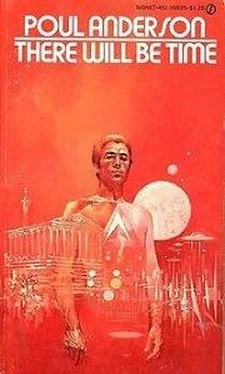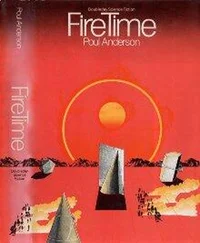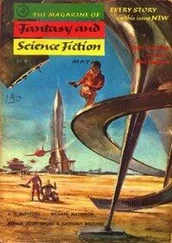Poul Anderson - There Will Be Time
Здесь есть возможность читать онлайн «Poul Anderson - There Will Be Time» весь текст электронной книги совершенно бесплатно (целиком полную версию без сокращений). В некоторых случаях можно слушать аудио, скачать через торрент в формате fb2 и присутствует краткое содержание. Год выпуска: 1972, Издательство: Doubleday, Жанр: Фантастика и фэнтези, на английском языке. Описание произведения, (предисловие) а так же отзывы посетителей доступны на портале библиотеки ЛибКат.
- Название:There Will Be Time
- Автор:
- Издательство:Doubleday
- Жанр:
- Год:1972
- ISBN:нет данных
- Рейтинг книги:5 / 5. Голосов: 1
-
Избранное:Добавить в избранное
- Отзывы:
-
Ваша оценка:
- 100
- 1
- 2
- 3
- 4
- 5
There Will Be Time: краткое содержание, описание и аннотация
Предлагаем к чтению аннотацию, описание, краткое содержание или предисловие (зависит от того, что написал сам автор книги «There Will Be Time»). Если вы не нашли необходимую информацию о книге — напишите в комментариях, мы постараемся отыскать её.
Nominated for Hugo Award for Best Novel in 1973.
There Will Be Time — читать онлайн бесплатно полную книгу (весь текст) целиком
Ниже представлен текст книги, разбитый по страницам. Система сохранения места последней прочитанной страницы, позволяет с удобством читать онлайн бесплатно книгу «There Will Be Time», без необходимости каждый раз заново искать на чём Вы остановились. Поставьте закладку, и сможете в любой момент перейти на страницу, на которой закончили чтение.
Интервал:
Закладка:
Leonce had been furious at being left behind. But she lacked the knowledge to be useful here, except as companion and consoler. Indeed, she would have been a liability, her extreme foreignness drawing stares. Havig meant to pass for a Scandinavian on pilgrimage — Catholic, true, but less to be detested than a Frenchman, Venetian, Aragonese, anyone from those western Mediterranean nations which pressed wolfishly in on the dying Empire. As a Russian he would have been more welcome. But Russians were common thereabouts, and their Orthodox faith made them well understood. He dared not risk a slip.
He didn’t start in the year of the conquest. That would be too turbulent, and every outsider too suspect, for the detailed study he must make. The Crusaders actually entered Constantinople in 1203, after a naval siege, to install a puppet on its throne. They hung around to collect their pay before proceeding to the Holy Land. The puppet found his coffers empty, and temporized. Friction between East Romans and “Franks” swelled to terrifying proportions. In January 1204, Alexius, son-in-law of the deposed Emperor, got together sufficient force to seize palace and crown. For three months he and his people strove to drive the Crusaders off. Their hope that God would somehow come to their aid collapsed when Alexius, less gallant than they, despaired and fled. The Crusaders marched back through opened portals. They had worked themselves into homicidal self-righteousness about “Greek perfidy,” and the horror began almost at once.
Havig chose spring, because it was a beautiful season, in 1195, because that was amply far downtime, for his basic job of survey. He carried well-forged documents which got him past the city guards, and gold pieces to exchange for nomismae. Alter finding a room in a good inn-nothing like the pigsty he’d have had to endure in the West-he started exploring.
His prior visit had been to halcyon 1050. The magnificence he now encountered, the liveliness and cosmopolitan colorfulness, were no less. However raddled her dominion, New Rome remained the queen of Europe.
Havig saw her under the shadow.
The house and shop of Doukas Manasses, goldsmith, stood on a hill near the middle of the city. Square-built neighbors elbowed it, all turning blind faces onto the steep, wide, well-paved and well-swept street. But from its flat roof you had a superb view, from end to end of the vast, towered walls which enclosed the city, and further: across a maze of thoroughfares, a countlessness of dweffings and soaring church domes; along the grand avenue called the Mesé to flowering countryside past the Gate of Charisius, on inward by columns which upbore statuary from the noblest days of Hellas, monasteries and museums and libraries which preserved works by men like Aeschylus and women like Sappho that later centuries would never read, through broad forums pulsing with life, to the Hippodrome and that sprawling splendid complex which was the Imperial Palace. On a transverse axis, vision reached from glittering blue across the Sea of Marmora to a mast-crowded Golden Horn and the rich suburbs and smaragdine heights beyond.
Traffic rivered. The noise of wheels, hoofs, feet, talk, song, laughter, sobbing, cursing, praying blended together into one ceaseless heartbeat. A breeze carried a richness of odors, sea, woodsmoke, food, animals, humanity. Havig breathed deep.
“Thank you, Kyrios Hauk,” Doukas Manasses said. “You are most courteous to praise this sight.” His manner implied mild surprise that a Frank would not sneer at everything Greek. To be sure, Hauk Thomasson was not really a Frank or one of the allied English, he was from a boreal kingdom.
“Less courteous than you, Kyrios Manasses, to show me it,” Havig replied.
They exchanged bows. The Byzantines were not basically a strict folk-besides their passionate religion and passionate sense for beauty, they had as much bustling get-up-and-go, as much inborn gusto, as Levantines in any era-but their upper classes set store by ceremonious politeness.
“You expressed interest,” Doukas said. He was a gray-bearded man with handsome features and nearsighted eyes. His slight frame seemed lost in the usual dalmatic robe.
“I merely remarked, Kyrios, that a shop which produced such elegance as does yours must be surrounded by inspiration.” You could case public buildings easily enough; but your way to learn what private hands held what wealth was to go in, say you were looking for a gift to take home, and inspect a variety of samples.
Well, dammit, Doukas and his apprentices did do exquisite work.
“You are too kind,” the goldsmith murmured. “Although I do feel — since all good stems from God — that we Romans should look more to His creation, less to conventionality, than we have done.”
“Like this?” Havig pointed at a blossoming crabapple tree in a large planter.
Doukas smiled. “That’s for my daughter. She loves flowers, and we cannot take her daily on an outing in the country.”
Women enjoyed an honorable status, with many legal rights and protections. But perhaps Doukas felt his visitor needed further explanation: “We may indulge her too much, my Anna and I. However, she’s our only. That is, I was wedded before, but the sons of sainted Eudoxia are grown. Xenia is Anna’s first, and my first daughter.”
On impulse he added: “Kyrios Hauk, think me not over-bold. But I’m fascinated to meet a… friendly… foreigner, from so remote a country at that. It is long since there were many from your lands in the Varangian Guard. I would enjoy conversing at leisure. Would you honor our home at the evening meal?”
“Why-why, thank you.” Havig thought what a rare chance this was to find things out. Byzantine trades and crafts were organized in tight guilds under the direction of the prefect. This man, being distinguished in his profession, probably knew all about his colleagues, and a lot about other businesses. “I should be delighted.”
“Would you mind, my guest, if wife and child share our board?” Doukas asked shyly. “They will not interrupt. Yet they’d be glad to hear you. Xenia is, well, forgive my pride, she’s only five and already learning to read.”
She was a singularly beautiful child.
Hauk Thomasson returned next year and described the position he had accepted with a firm in Athens. Greece belonged to the Empire, and would till the catastrophe; but so much trade was now under foreign control that the story passed. His work would often bring him to Constantinople. He was happy to have this opportunity of renewing acquaintanceship, and hoped the daughter of Kyrios Manasses would accept a small present — “Athens!” the goldsmith whispered. “You dwell in the soul of Hellas?” He reached up to lay both hands on his visitor’s shoulders. Tears stood in his eyes. “Oh, wonderful for you, wonderful! To see those temples is the dream of my life … God better me, more than to see the Holy Land.”
Xenia accepted the toy gratefully. At dinner and afterward she listened, rapt, till her nanny shooed her to bed. She was a sweet youngster, Havig thought, undeniably bright, and not spoiled even though it seemed Anna would bear no more children.
He enjoyed himself, too. A cultured, sensitive, observant man is a pleasure to be with in any age. This assignment was, for a while, losing its nightmare quality.
In truth, he simply skipped ahead through time. He must check up periodically, to be sure events didn’t make his original data obsolete. Simultaneously he could develop more leads, ask more questions, than would have been practical in a single session.
But — he wondered a few calendar years later — wasn’t he being more thorough than needful? Did he really have to make this many visits to the Manasses family, become an intimate, join them on holidays and picnics, invite them out to dinner or for a day on a rented pleasure barge? Certainly he was exceeding his expense estimate … To hell with that. He could finance himself by placing foreknowledgeable bets on events in the Hippodrome. An agent working alone had broad discretion.
Читать дальшеИнтервал:
Закладка:
Похожие книги на «There Will Be Time»
Представляем Вашему вниманию похожие книги на «There Will Be Time» списком для выбора. Мы отобрали схожую по названию и смыслу литературу в надежде предоставить читателям больше вариантов отыскать новые, интересные, ещё непрочитанные произведения.
Обсуждение, отзывы о книге «There Will Be Time» и просто собственные мнения читателей. Оставьте ваши комментарии, напишите, что Вы думаете о произведении, его смысле или главных героях. Укажите что конкретно понравилось, а что нет, и почему Вы так считаете.












